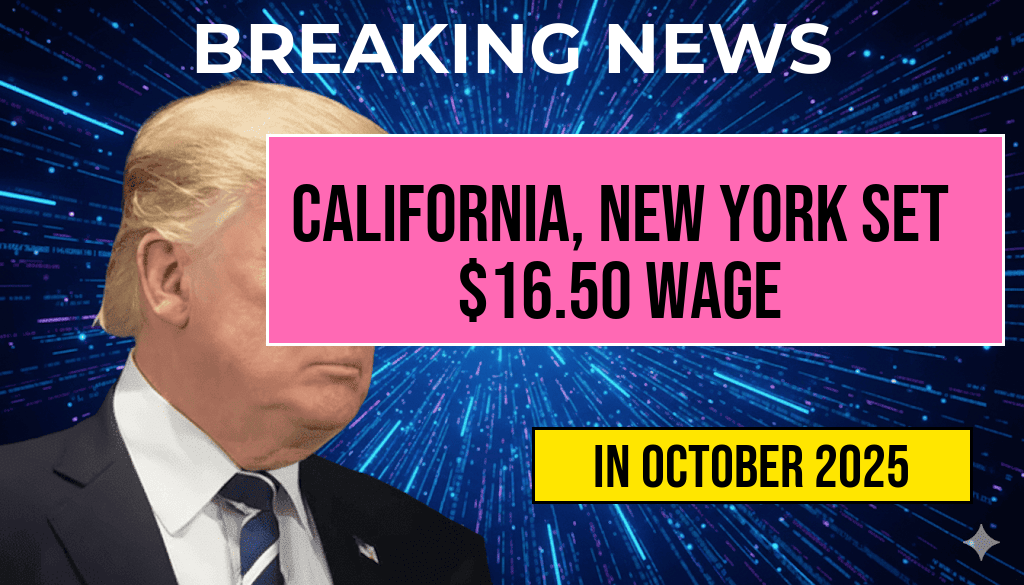California and New York are gearing up to implement a new minimum wage of $16.50 per hour, a significant move aimed at improving the financial stability of workers in two of the nation’s largest economies. The changes are set to take effect in the coming months, reflecting ongoing efforts to address the rising cost of living and economic disparities faced by low-income residents. With inflation and housing costs continuing to soar, both states hope that this wage increase will provide much-needed relief to their working populations. The legislation has garnered support from various advocacy groups, while also facing criticism from some business owners concerned about potential impacts on employment and operational costs.
Details of the Minimum Wage Increase
The wage hike is part of a broader legislative framework aimed at ensuring fair compensation for workers. California and New York have been at the forefront of the movement advocating for higher minimum wages, citing studies that link improved wages to better worker productivity and job satisfaction.
Implementation Timeline
In California, the minimum wage increase is scheduled to take effect on January 1, 2024. New York will follow suit, implementing the new wage rate on the same date. The phased approach allows businesses time to adjust to the changes, although some advocates argue that immediate action is necessary given the current economic climate.
Economic Implications
The decision to raise the minimum wage has sparked a robust debate among economists, business owners, and labor advocates. Proponents argue that a higher wage will boost consumer spending, which can stimulate economic growth. They suggest that the increase could lead to a decrease in employee turnover, as workers feel more valued and secure in their roles.
- Increased Consumer Spending: Higher wages provide workers with more disposable income, which can lead to increased spending in local economies.
- Reduced Turnover: Companies may benefit from lower turnover rates, as employees are less likely to leave for better-paying jobs.
- Potential Job Losses: Critics warn that some businesses may struggle to absorb the increased labor costs, potentially leading to layoffs or reduced hiring.
Support and Opposition
The decision has received widespread support from labor unions and various community organizations. The Forbes Human Resources Council emphasizes the role of higher wages in reducing poverty and improving overall economic conditions. Conversely, some small business owners express concern that the wage hike could jeopardize their operations, particularly in sectors like retail and hospitality, which often operate on thin profit margins.
Response from Business Owners
Business leaders argue that while the intent behind raising the minimum wage is commendable, the reality of implementation poses challenges. Many are advocating for a more gradual increase or additional support for small businesses to offset the potential financial strain. A survey conducted by the Small Business Administration found that nearly 60% of small business owners are concerned about how rising wages will impact their ability to stay competitive.
Conclusion
The upcoming implementation of a $16.50 hourly minimum wage in California and New York stands as a landmark shift in labor policy. As both states move forward, the outcome of this wage increase will be closely monitored by policymakers across the nation. The balance between supporting low-income workers and maintaining a thriving business environment will be critical in shaping the future of labor laws in the United States.
| State | Current Minimum Wage | New Minimum Wage (Effective Jan 2024) |
|---|---|---|
| California | $15.50 | $16.50 |
| New York | $15.00 | $16.50 |
Frequently Asked Questions
What is the new minimum wage rate in California and New York?
The new minimum wage rate in both California and New York is set to be $16.50 per hour.
When will the $16.50 minimum wage be implemented?
The implementation date for the $16.50 minimum wage in California and New York is scheduled for 2024.
Who will benefit from the increase in minimum wage?
The increase to $16.50 per hour will benefit low-wage workers across various sectors in California and New York, ensuring a better standard of living.
Are there any exceptions to the minimum wage increase?
While most workers will see an increase to $16.50, certain industries and roles may have specific exceptions or different regulations based on local laws.
How does the new minimum wage compare to previous rates?
The new minimum wage of $16.50 represents a significant increase from previous rates, reflecting the rising cost of living in both California and New York.

Leave a Reply